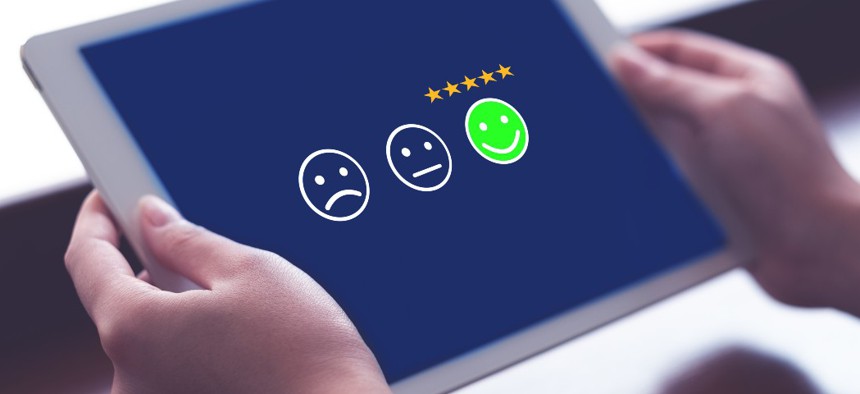How Improving Customer Experience Can Help the Employee Experience

Kiyoshi Hijiki/Getty Images
Federal employees can better help the people they serve—and see the full impact of that help—when customer experience is prioritized.
President Joe Biden’s recent executive order on customer experience challenges agencies to do more for the American consumer. This has huge implications, not only for customers of government agencies but also the employees of these agencies.
That's because agencies that are already doing the work of improving customer experience are seeing major benefits when it comes to their employees, too.
The link between customer experience and employee experience is part of the very fabric of our government—a government that is of the people, by the people and for the people.
When we think about the delivery of any government service—whether an unemployment benefit or passport service—hardworking employees deliver these services to make a difference in their communities, but often don't see the fruits of their labor. That's where the power of customer experience comes into play.
CX helps organizations better listen to customers—in this case, the American people—and empowers employees to see the impact of their efforts. Whether employees are responsible for providing families with benefits or processing claims, getting direct customer feedback helps validate the reason they're working for the government.
Focusing on customer experience is also instrumental to successfully achieving digital transformation and agile workforce initiatives, especially given the fact that agency processes, technologies and policies can create barriers for both the customer and employees looking to provide exceptional service. Many agencies are working to improve these systems to align them to optimal customer experiences, which can in turn improve the employee experience.
For example, the Department of Veterans Affairs rolled out a customer experience program that captures customer feedback. They've found that 70% of the comments they receive are filled with compliments about their staff, positive feedback which is now a huge motivator for VA employees in seeing the meaningful impact of their work.
The technology factor
Traditionally, agencies have long listened to their customers through lengthy annual market research surveys. Yet by the time this labor-intensive gathering process is complete, the data is usually obsolete.
That's something that President Biden’s executive order addresses with a clear call to action: "We must use technology to modernize government and implement services that are simple to use, accessible, equitable, protective, transparent and responsive for all people of the United States."
Agencies like the VA, Department of Agriculture, Social Security Administration, the Internal Revenue Service and other High Impact Service Providers are already implementing technology such as machine learning to listen to, understand and meet the needs of customers in real time. These tools slash the manual labor hours needed to process customer feedback, delivering instantaneous insights. For example, when a customer reaches out to an agency's contact center, this technology can capture, analyze and empower agency employees to better act upon every single word that's being said. That's why these tools are no longer nice to have, they're fundamental to agencies fulfilling their missions.
With the right tools, people and processes, agencies no longer have to react to customer behavior, but instead can anticipate needs before they arise. Agencies that have taken this step are already seeing major employee experience benefits across the board: lower turnover, higher retention and stronger recruitment outcomes.
Why the time is now
The public sector is at a pivotal moment. For one, about 7% of federal employees are under the age of 30, compared to the national private sector average of 20%. As baby boomers retire, there simply aren't enough Gen Z and millennial employees joining the federal workforce.
At the same time, the nature of work is changing, and agencies need to realign to the new context of remote and hybrid work environments. And last but not least, the American people now expect government experiences to be on par with brand experiences.
It's clear. The time is now for agencies to reimagine the employee experience and shift away from the industrial age to a modern mindset that's ready to embrace the future of work.
Lee Becker is the senior vice president and general manager for public sector at Medallia. Lee has over 20 years of experience in regulated industries and public sector, in various strategic and operational capacities including at the Department of Veterans Affairs, Department of Defense and co-leading the White House cross-agency priority goal on customer experience for all of government.





